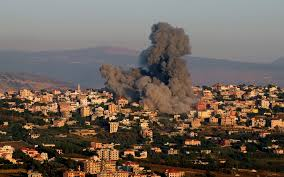Almost two decades after Israel’s last war on Lebanon, Israel and Hezbollah are once again at odds. Both have learned lessons from the previous war and both are fighting the current war in the light of that experience. Both have opportunities to harm each other and fear to lose a lot. However, the difficulties may be more for Hezbollah this time than in the previous war. If a ground war starts, both sides will fear each other.
A ground war between the two warring parties would probably be a different story. According to a Wall Street Journal report, Hezbollah, which has been regularly targeting targets in Israel for nearly a year, has a large stockpile of missiles, drones and anti-tank missiles that it can use to counter Israeli ground advances.
Israeli superiority in the field of technology and intelligence
One of Hizb’s most dangerous new weapons is the Iranian-made Almas anti-tank guided missile, which will help Hizballah target its attacks with greater precision. In this way, Hezbollah can perform much better than the previous war fought with Israel in 2006. In recent days, Israel has launched a devastating offensive against Hezbollah through airstrikes and remote-controlled explosions that have put the Lebanese armed group on the defensive. These attacks by Israel demonstrate Israel’s vast superiority in intelligence gathering and technology.
In the final days of the Lebanon War in the summer of 2006, the smouldering remains of Israel’s heavily armed Merkava tanks, considered among the best in the world, became a powerful symbol across the region. Armed combatants who lacked military and technological superiority emerged from the war weakened, but not defeated.
The most heavily armed non-state militia in the world
Hezbollah, which was formed in the chaos of civil war in the 1980s, has not only managed to rebuild its weapons stockpile over the past eight years, but has also significantly increased it. It is now considered one of the most heavily armed non-state militias in the world. Israel, for example, has tens of thousands of troops and is estimated to have more than 150,000 missiles and all kinds of weapons, according to a report published by the Times newspaper.
Israel has spent years gathering intelligence on Hezbollah. The newspaper quoted Matthew Saville, director of military science at the Royal United Services Institute (RUSSI), as saying, “Nonetheless, Hezbollah should not make the mistake of underestimating its strength.” But is a ground war inevitable? Explosive drones and heavy missiles with 1,000 kg warheads have devastated Lebanese villages in recent days, killing hundreds and displacing thousands.
However, Israel cannot achieve much through the air, especially when it is dealing with small, easily transportable rocket launchers and when it is believed that much of Hezbollah’s infrastructure is underground. “It is now clear that ground attacks in any form are increasingly inevitable – a move that Lebanon has warned could jump in if ground fighting breaks out,” the report said.
Land War a “Historic Occasion” According to the report, military analysts believe it would be “foolish” on Israel’s part as it would lead to an asymmetric war involving unconventional and conventional tactics where Hezbollah has a military advantage.
In fact, Hezbollah Secretary General Hassan Nasrallah said last week that the Israeli attack on southern Lebanon is not a threat but a “historic opportunity”. According to experts, Hezbollah will take the lead militarily in this matter. That if Israel decides to come to our land, it will find nothing but the dead bodies and wounded of its soldiers.
The Times quoted Elon Mizrahi, an Arab-Jewish Israeli analyst, as saying that Hezbollah aims “to trap Israel in the hellhole of southern Lebanon. Perhaps the most armed and tactically committed to guerrilla warfare anywhere in the world.” “Less theatre could be Hezbollah’s in Lebanon.” The terrain, with its rivers and valleys, is well-suited for Hezbollah, and southern Lebanon poses a particular challenge to any invading force. The area is useful for any armed militia, especially those who have spent decades consolidating their bases in the area.” Attack tunnels” are different from Hamas tunnels.
Through excavation, Hezbollah has been digging tunnels in open barren fields without detection. Some of these are considered to be “attack tunnels” that vehicles and even medium-sized trucks can enter, moving from one area to another. The report added that “its Later, there are tactical tunnels near the villages that help the militants fight underground. From here they can shoot through tunnel openings and then disappear.
In August, Hezbollah, designated a terrorist organization by the United States and Britain, produced a spectacular staged video of its vast network of tunnels, showing fighters carrying missiles through well-lit underground passages. Shown driving large trucks. This was a message to the Israelites.
Nicholas Blanford, an expert on Hezbollah and a fellow at the Atlantic Council, told The Times that Hezbollah had a range of state-like capabilities and a large arsenal that enabled it to operate. He has an effective guerilla force that makes him a formidable force on the side of an army.
According to the American security think tank Centre for Strategic and International Studies (CSIS), its forces are primarily light infantry trained and equipped to operate with stealth, mobility and independence.






